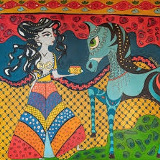Lore of the Unicorn (2): Taylorism Saves the Day · 2:35am May 18th
Before we embark on any further essays to fathom the unicorn—and seeing as we have remarked the work of one of its chroniclers, Odell Shepard, as being also the work of the first brony, and therefore parallel to our own work in the present time—it may be worthwhile to observe its countercurrent in the twentieth century; namely, that before Howard Stern and Mike Nelson, there was already an ‘anti-brony’ in the person of noted futurist Henry Ford, whose entrepreneurial success, however interspersed it was with technological sidelights, nonetheless initiated the bronies’ history of social quarantine.
Ford grew up on a farm in Michigan, where, owing to a lack of better reading material, he was constantly subjected to recitations from the twelfth century French Medieval poem Chansons de geste, which instilled in him a contempt for fantasy as well as neo-platonic conceptions of godhead. He especially hated Bayard, the legendary mare which could transmogrify to suit any number of riders, as a symbol of the vanity of technological progress. One day, when he saw a self-propelling cart attached to a threshing engine, he said, “I had had it with Descartes’ dualism, and saw that I could build an automation—similar in function to the dangerous and ill-tempered horse—that would disprove the existence of the soul and god.”
He would later describe his model-T as “essentially a theological statement” and “certainly not meant to be ridden around in.”
Ford’s mechanical horses—which would eventually go into mass production to quell what he perceived as a resurgence of medieval pantheism—proved (at least for a time) that unicorns, and many other things, weren’t real. But Bayard would strike again after Ford’s death; for technological problems always have technological solutions. Thus it was Lauren Faust, who, diving into Frederick Wilson Taylor’s Principles of Scientific Management, conceived a world where horses and unicorns alike could be schematized toward optimized social production—thereby lifting the bronies, once more, out of the hovel of obscurity.




In some cruel stroke of irony, you just can't keep a metaphorical Bayard down, and you might argue that while horses receded in numbers, in the modern age they only became more mystified and beloved by the people. Especially by the children!
But imagine hating something so strongly that it facilitate world-wide technological advancement? Now that's fascinating. Very human to me.